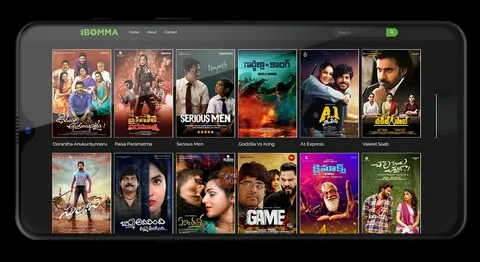Introduction
The rise of ibomma, a notorious torrent website, has ignited controversy surrounding online piracy. While some view it as a means to access content freely, others condemn it as a flagrant violation of intellectual property rights. This comprehensive analysis delves deep into the world of ibomma, unraveling its operations, legal implications, and the far-reaching consequences it has sparked.
The Torrent Technology Behind Ibomma
At its core, ibomma operates on the principles of torrent technology, a peer-to-peer file-sharing system that allows users to download content from multiple sources simultaneously. This decentralized approach has made it challenging for authorities to clamp down on the platform effectively as new mirror sites and proxies continually emerge to circumvent blockades.
Unraveling the World of BaddieHub: Your Ultimate Guide
A Catalyst for Piracy Concerns
Ibomma’s vast repository of pirated movies, TV shows, and other digital content has raised alarm bells among copyright holders, industry associations, and government authorities. The website’s seamless interface and user-friendly design have made it a go-to destination for those seeking free access to entertainment, often before official release dates or legal streaming options are available.
The Legal Battleground
Authorities and content creators have waged a relentless war against ibomma, employing a range of tactics from legal crackdowns and domain seizures to technological countermeasures. However, these efforts have largely been a game of whack-a-mole as the platform swiftly adapts and resurfaces under new domains or mirrored sites.
The Role of Internet Service Providers
Internet Service Providers (ISPs) have found themselves caught in the crosshairs of the piracy debate. While some have cooperated with court orders to block access to ibomma, others have faced criticism for not doing enough to combat piracy on their networks. This conundrum highlights the delicate balance between protecting intellectual property rights and upholding free speech and internet neutrality principles.
Ethical Considerations and Consumer Responsibility
Beyond the legal realm, the existence of ibomma raises crucial ethical questions. While the allure of free content may be tempting, consuming pirated materials deprives creators of their rightful compensation and undermines the sustainability of the entertainment industry. Consumers must grapple with the moral implications of their choices and consider supporting legitimate avenues for accessing content.
Socioeconomic Factors and Access Disparities
In regions where legal streaming services or affordable entertainment options are limited, ibomma may be perceived as a means of bridging the digital divide. However, this perspective does not absolve piracy’s legal and ethical implications. Addressing the root causes of these access disparities through legitimate means, such as promoting affordable pricing models and expanding distribution channels, is crucial.
Alternatives to Ibomma
For those seeking legal and ethical alternatives, a plethora of options exist. Subscription-based streaming services, official platforms by content creators, and partnerships with legal streaming services offer a wealth of content at reasonable prices. Additionally, movements like Creative Commons and open-source content provide legal avenues for accessing and sharing creative works.
Emerging Technologies and the Future of Content Distribution
As technology advances, new distribution models and platforms are emerging, offering innovative ways to access and consume content. Virtual reality (VR), augmented reality (AR), and blockchain technology can disrupt traditional distribution models, presenting both opportunities and challenges in the realm of piracy.
Collaborative Approaches and Alternative Models
In response to the persistent challenges posed by piracy, some stakeholders have explored collaborative approaches and alternative business models. These initiatives aim to balance protecting intellectual property rights and meeting consumer demands through innovative revenue streams, distribution models, and pricing strategies.
Education and Awareness Campaigns
Addressing the root causes of piracy also necessitates educational efforts and awareness campaigns. By highlighting the negative impacts on the creative industries and the legal and ethical implications, these campaigns can discourage the consumption of pirated content and promote the support of legitimate platforms and creators.
Global Reach and Cross-Border Challenges
The internet has transformed piracy into a global phenomenon, transcending geographical boundaries. Websites like ibomma can be accessed from virtually anywhere, making it challenging for individual nations to effectively enforce copyright laws and curb illegal activities. This cross-border nature necessitates international cooperation and harmonized legal frameworks.
Ongoing Dialogue and Collaboration
Ultimately, combating the complex challenges posed by online piracy requires ongoing dialogue and collaboration among various stakeholders, including content creators, industry representatives, policymakers, technology companies, and consumer advocates. By fostering open communication and exploring diverse perspectives, sustainable solutions can be developed to balance the interests of all parties involved.
Societal and Cultural Impacts
Beyond the legal and economic implications, online piracy can have broader societal and cultural impacts. It may contribute to normalizing illegal behavior, erode respect for intellectual property rights, and potentially stifle creativity and innovation in the long run. These broader considerations are often overlooked in the narrower debates surrounding piracy.
Striking a Balance
At the heart of the piracy debate lies the delicate balance between protecting intellectual property rights and ensuring reasonable access to creative works. While piracy is not the solution, there is a need for ongoing dialogue and exploration of sustainable models that incentivize creativity while making content accessible to a wider audience through legitimate means.
The Future Outlook
As technology continues to evolve, the battle against online piracy will undoubtedly face new challenges. Emerging platforms, distribution models, and innovative content formats will require vigilance and adaptability from all stakeholders involved. It will be crucial to embrace emerging technologies, such as blockchain and decentralized systems while addressing their potential vulnerabilities to piracy.
Moreover, the role of internet intermediaries, such as search engines, web hosting services, and online payment processors, will become increasingly important. While they play a vital role in enabling the free flow of information online, they also bear a responsibility to take proactive measures to curb the spread of pirated content and disable financial support for piracy networks.
Ultimately, the solution to the piracy conundrum lies in protecting intellectual property rights and ensuring reasonable access to creative works. This balance can only be achieved through collaborative efforts, innovative business models, and a collective commitment to fostering a sustainable and equitable content creation and consumption ecosystem.
Conclusion
The existence of ibomma and similar torrent websites has sparked intense debates and highlighted the complexities surrounding online piracy. While the allure of free content may seem tempting, it is crucial to recognize the far-reaching implications of piracy, both legal and ethical.
As this article has explored, piracy not only infringes on intellectual property rights but also has the potential to undermine the long-term sustainability of the creative industries. From filmmakers and musicians to independent creators and niche content producers, piracy can deprive artists of their rightful compensation and stifle innovation and diversity in the creative landscape.
However, the issue of piracy is not solely a legal matter; it is a multifaceted challenge that extends into socioeconomic, cultural, and philosophical realms. Access disparities, perceived monopolistic practices, and debates around the balance between creators’ rights and public access have fueled ongoing discussions and disagreements.
Addressing the root causes of piracy requires a collaborative and multidimensional approach that involves all stakeholders – content creators, industry representatives, policymakers, technology companies, and consumer advocates. By fostering open communication, exploring alternative business models, and promoting education and media literacy, there is potential to develop sustainable solutions that balance the interests of all parties while upholding ethical principles.
Ultimately, the choice is ours – to perpetuate the cycle of piracy or to embrace a future where creativity is nurtured, innovation is rewarded, and the art of storytelling continues to captivate and inspire generations to come.
FAQs
Is using ibomma legal?
No, ibomma is an unauthorized torrent website that facilitates the distribution of pirated content, which is considered illegal in most jurisdictions. Accessing and downloading copyrighted materials without proper authorization constitutes copyright infringement.
Why should I avoid using ibomma?
Using ibomma contributes to the piracy ecosystem and deprives content creators and rights holders of their rightful compensation. Additionally, downloading pirated content may expose your device to malware and other security risks.
What are the legal alternatives to ibomma?
Legal alternatives to ibomma include subscription-based streaming services like Netflix, Hulu, and Amazon Prime Video and official platforms and partnerships offered by content creators and distributors.
How does piracy affect the entertainment industry?
Piracy can have a significant impact on the entertainment industry by reducing revenue streams, discouraging investment in new projects, and undermining the sustainability of the creative ecosystem. It also deprives creators and rights holders of their rightful compensation for their work.
What steps can be taken to combat piracy?
Combating piracy involves a multi-faceted approach, including legal action against piracy websites, implementation of anti-piracy technologies, education campaigns to raise awareness about the consequences of piracy, and promotion of legal and affordable access to content.

